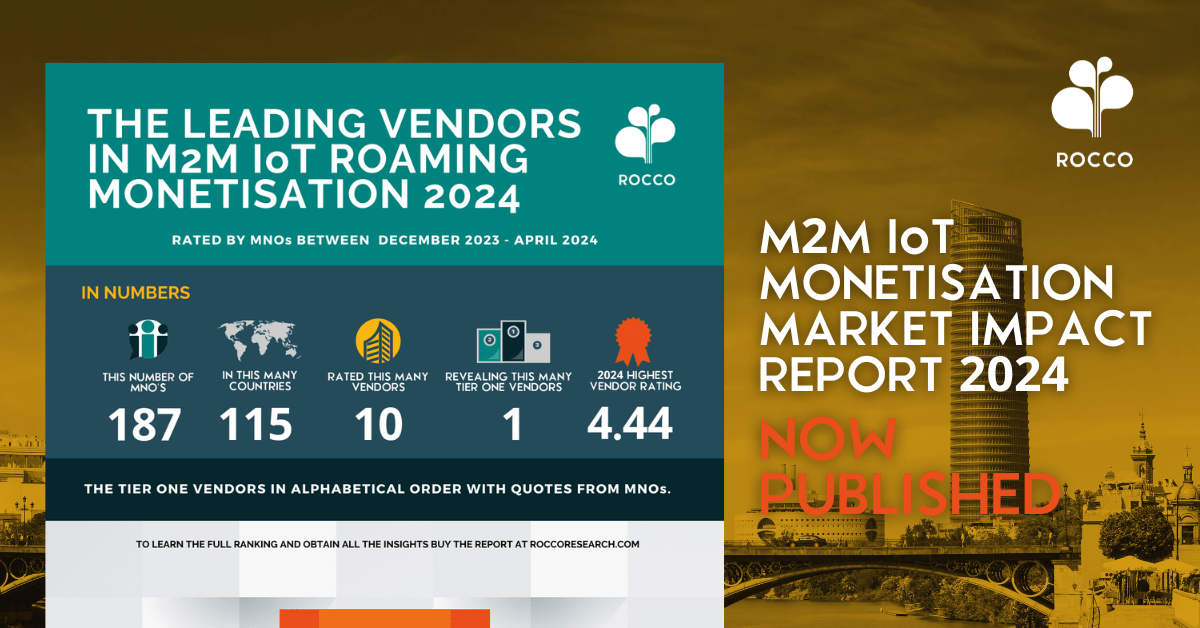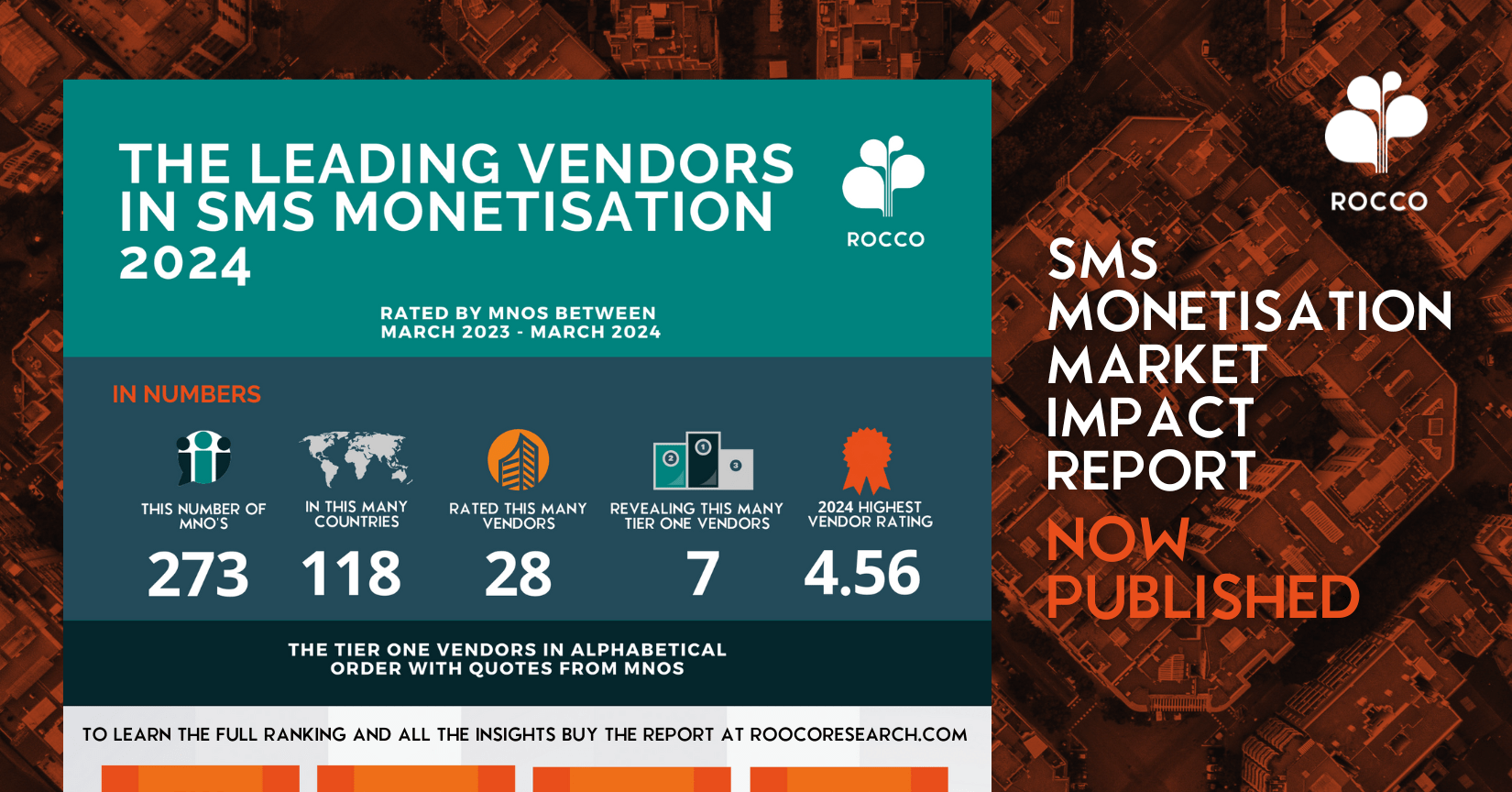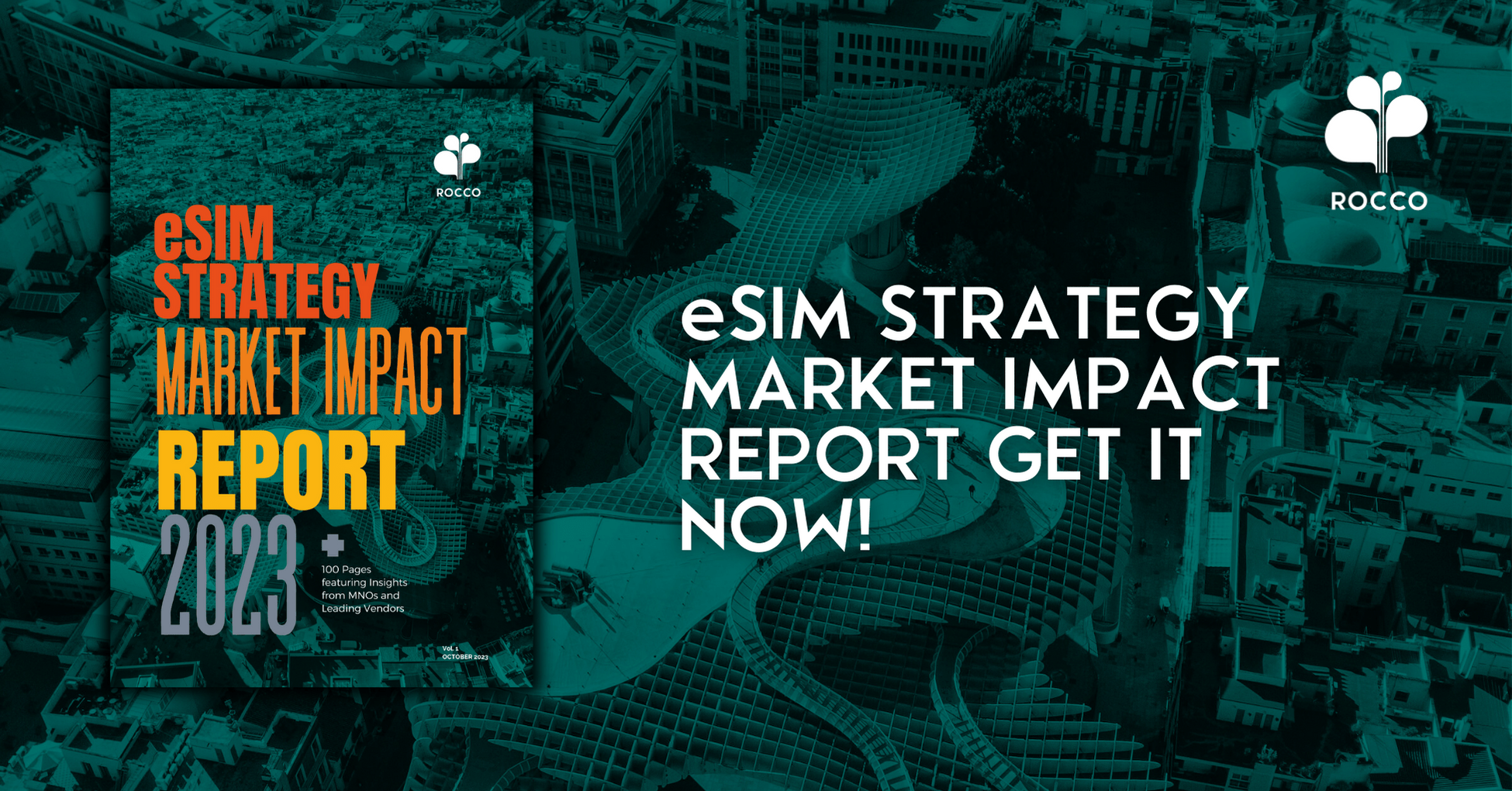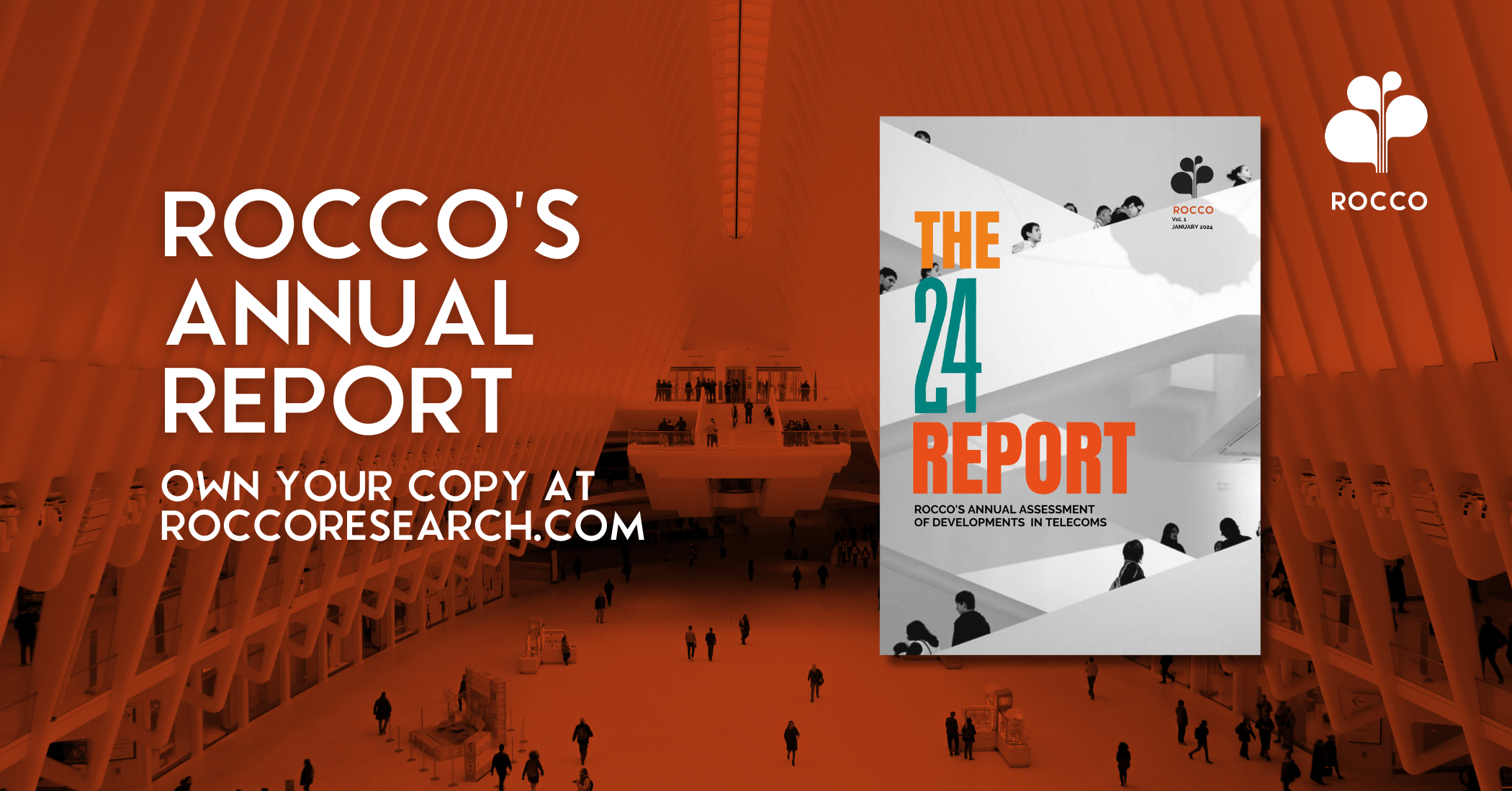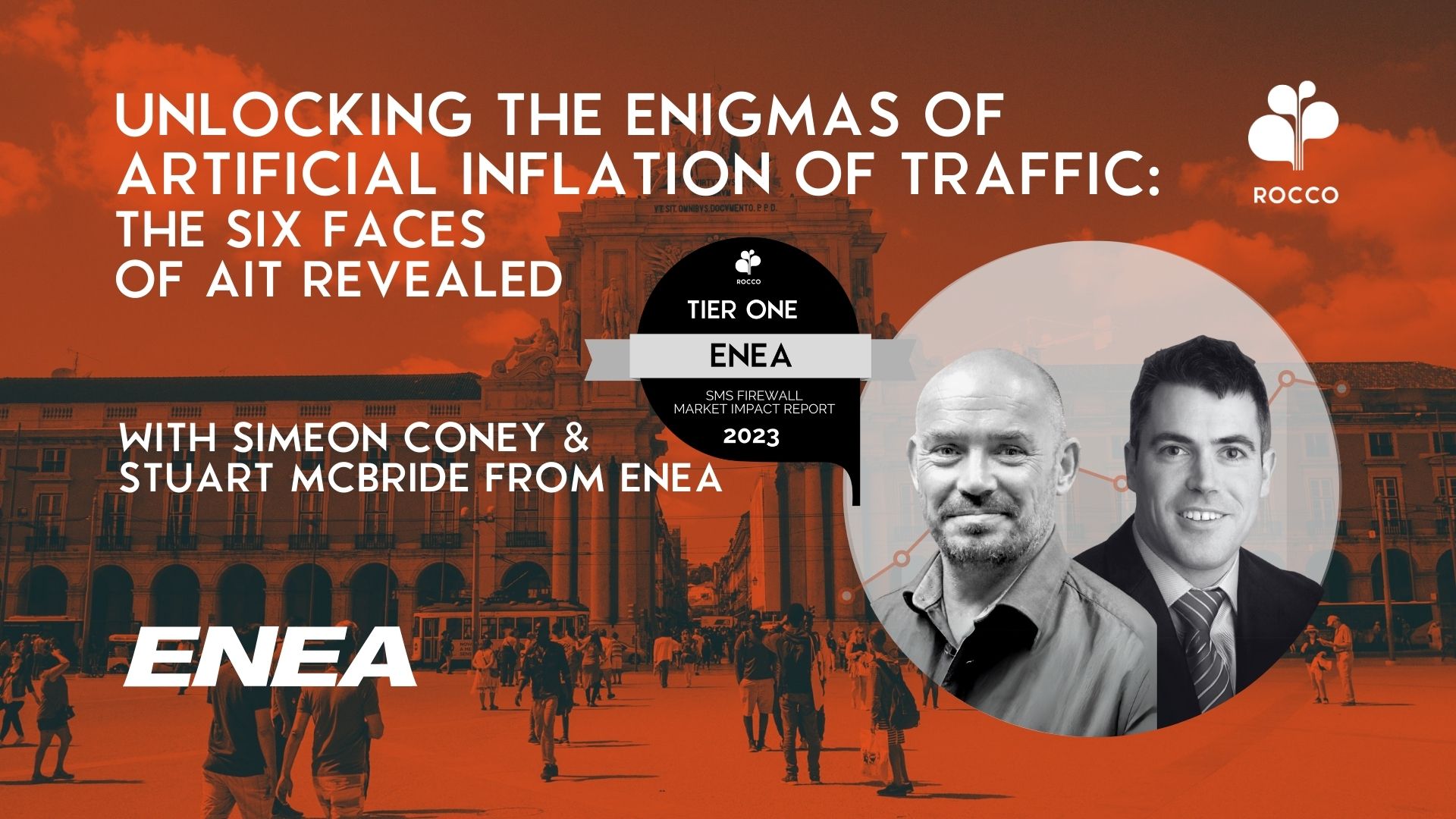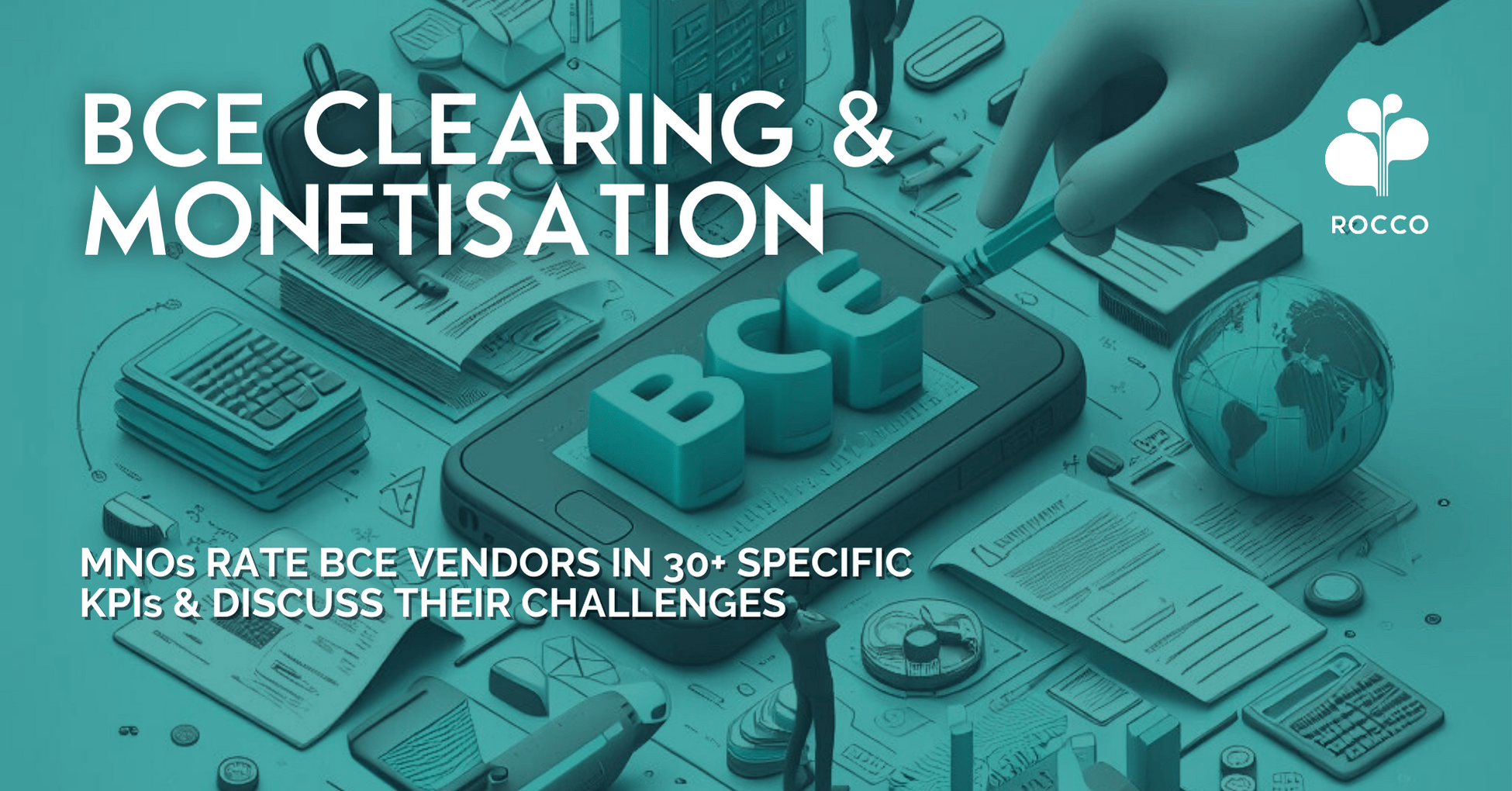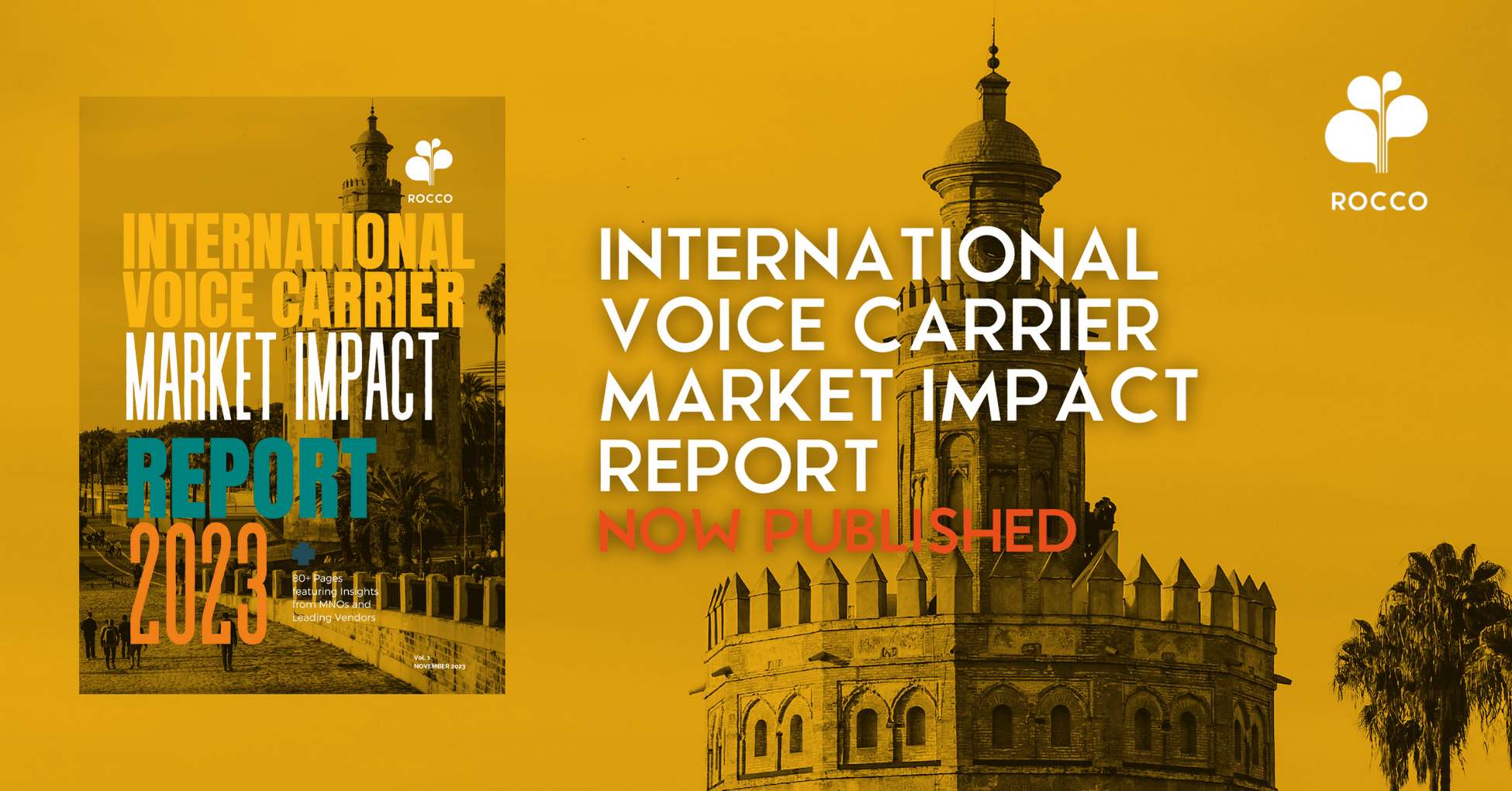 ROCCO IOO: Congratulations to Wangeci Kanjama
ROCCO IOO: Congratulations to Wangeci Kanjama
Jason – In 2020, ROCCO announced the 100 most influential people in our sector of telecoms industry. Following a six month period of research, we asked the industry to nominate the most influential people that they knew, and tell us why they were nominating them. The results were really incredible to see, we received 1000s of nominations for around 150 candidates from across every region of the world, we didn’t only want to recognise the most powerful or senior people in the industry, we weren’t looking only to recognise CEOs. This was about people in all kinds of roles, and all kinds of levels who develop and change our industry for the better. Following a view by our judging panel, we presented the 100 ranking our annual Genesis event in May 2020, we didn’t show the ranking of the top 25 people because we were planning on presenting awards to them in person. However, that just became impossible to do.
So before we start on our research for ROCCO 1OO 2022, which begins on the first of October 2021. We wanted to take the time to recognise the overall ranking of the top 25 for 2020. We’re publishing a new version of the report with the overall ranking. And we’re interviewing the number one ranked person.
It’s with great pleasure that we reveal the number one ranking person in the ROCCO 100 for 2020 was Wangeci Kanjama from M-Pesa. In this podcast, we get to know Wangeci a little bit better, and hear what she thought of these results.
The Interview with Wangeci in Transcript
Wangeci – Really, your greatest accomplishments usually come from some of your most challenging encounters. That’s actually what I’ve learned, that if you decide to take the road less travelled, what you’ll immediately find is that there is a lot of opportunity to learn and grow.
Jason Bryan – I’m here with Wangeci Kanjama from M-Pesa Africa. And what’s your role in M-Pesa Africa.
Wangeci Kanjama – So my role in Mpesa. Africa. I’m currently the finance director. That role is a role that I got into last year in September, M-Pesa Africa is a subsidiary of Safaricom. It’s actually a joint venture between Vodacom group and Safaricom PLC. The whole idea was to create a very powerful Centre of Excellence for the M-Pesa ecosystem. We currently oversee six countries, and those countries are based out of Africa. And the idea is to expand and grow our footprint.
JB – I’ve been studying a lot about M-Pesa. Because we are doing a training course on FinTech. So I heard it mentioned so often congratulations on this project.
WK – Thank you. Thank you.
JB – Wangeci your name has been mentioned a lot in our office over the last year and a half, because we were also delighted to see what happened with this project.
I want to recap a little bit on that before we go into the questions that we have for you. So in the ROCCO 100, we asked for nominations in around October 2019. And for the nominators to tell us why they thought the people they were nominating were good. We received over 100 responses, nominating you. We asked for the nominators also to rate you on key characteristic traits for influential people. Over 75% of the nominators said you were a visionary person and that you were one of most Knowledgeable people they knew.
But it was the personal comments people made about you which convinced the judges that you were the most deserving of this number one position. So let’s have a little review of some of the things which the industry people have said about you because I think is very special.
- Wangeci – is a visionary in the roaming space. She’s a transformational leader.
- Wangeci is always geared to see change and positive growth
- She can see around corners and is an inspiration.
- She’s an exceptional and motivational leader who allows people to learn from their mistakes.
- She gets things done, hence she is a go getter.
- She also works well in cross functional teams to get things done.
- Based on the magnitude of resources she manages, and with this, she’s able to handle it without dropping the ball at any single time.
- She’s a team player, and she goes out of her way to ensure everything is okay.
- Wangeci has been instrumental in helping Safaricom monetize their assets through the wholesale division, the growth of the unit from a small function to a key revenue function within Safaricom is because of Wangeci.
- She has the energy and drive to make things happen. Through her dedication and passion, she revolutionised the roaming and wholesale space by incubating it from its infancy to a fully fledged, operational profitable venture.
JB – I’m sure you remember lots of these things.
WK – Yeah, I do I do. It was quite a journey.
JB –
- She ensured that we expanded collaborations with other telcos so as to achieve a customer friendly price.
- She’s influenced policy within the company and with regulators as well. She’s made hard choices.
- Her approach towards solving problems and encouraging teaching, sharing with her team new methods, the operations for undersea cable that has changed the country connectivity landscape.
- Additionally, she’s been on the forefront of ensuring that sim-boxing is eliminated.
- She bought back wholesale into a profit making industry in the otherwise declining global outlook, putting the wholesale customer upfront.
- Wangeci has influenced a lot of wholesale roaming agreements, which could not have been possible without her, including a pioneering effort to work with Ethiopia
- Wangeci is a pace setter, who steps back and takes time to visualise the big picture. She also carries along her team, making sure that everyone has their focus on the vision and the picture of success.
 I could go on because there are over 100 comments like this about you. What do you think of these comments?
I could go on because there are over 100 comments like this about you. What do you think of these comments?
WK – Well, I’m humbled, I’m honoured it’s good to appreciate how people see you, the journey for wholesale was not an easy one. But I’m really proud of what we managed to achieve, because in many ways, it was a bit of an uphill task, because the orientation of the organisation is very consumer centric. So this was a very different compliment to the business. So the headspace was very, very different. It’s really humbling to hear because it was one of my greatest adventures, and one of the most rewarding because I really learned a lot in that space. I really did.
JB – It’s clear that people, the people around you, you have inspired them, and that they’re proud of you know.
WK – We inspire each other. I remember because we needed to really rethink the way we were doing the business, we needed to really work very well as a team. And I think it really pushed my limits as a leader because it was just so different from you know, anything we had done in Safaricom and was really a struggling part of the business.
So, to sit with a team put in rigour, put in discipline, we used to do in depth reviews, we travelled a lot. I realised wholesale was a very international business, you forge relationships that could carry you for years. So, it was a lot of hard work. Because we were starting from a point where the organisation wasn’t very clear about its potential within the industry, we weren’t really perceived to be very relevant or strong in wholesale.
So, we really changed our mindset as a team. But increasingly for me, I began to see a lot of potential because there’s a lot of sharing on the global stage. So obviously, you go for these conferences, and you just see amazing transformations of businesses, and just how they positioned wholesale. So that was a great inspiration for me as well.
But I also worked with a very special team. So, we pushed each other, and they really did make me a better leader. So that was also very true. I can’t take the credit for it all by myself. The team that I worked with also took a risk. They came from very divergent backgrounds, we had engineers, we had accountants, we had salespeople, and we all had to rejig our thinking to really bring the essence of wholesale and harmonise it and then deliver something of value. So, I’m really proud of what we managed to achieve. Thank you.
JB – Anybody that you would call out as a key influencer for you during that period?
WK – Honestly, the team itself, because people took risks in terms of their careers, people left, what they would consider their mainstream jobs and came into wholesale, which was untypical so I’d really like to commend the team.
I can’t pick out anyone specifically in that team, I’d like to say the whole team, we became extremely close, we established bonds and traditions and ways of inspiring each other that were just truly amazing. We worked extremely hard.
So, I’d really like to share this recognition with my team, I think they really outstanding, they came in knowing that we had to really prove ourselves. And there was a lot of work we needed to do. Sometimes we had some very tough discussions. We went for training together other times, we sat down and literally rewrote our strategy around A2P.
SMS was a business when we took over that was hardly doing anything. One day, I just said, enough is enough, we’re going to revamp this business, it’s going to grow, I set a target, the manager in charge looked on and wondered, but it began to really flourish. And we took that view with everything. So, when every revenue in wholesale was growing double digit, I remember the time my boss was like, did we set the right target? Or is the target too low? Because the revenues were really flourishing. And it really, it really made us proud, because we actually began to figure out what critical activities and initiatives were driving our business.
The other very good thing that happened is we earned the respect of our peers in the industry, because initially, we didn’t quite have our act together. So when it came to some of the key international bids or regional bids, actually, to be more specific, we weren’t really, you know, getting them and it was really frustrating.
We learnt a lot. I remember even when I made the foray into Ethiopia, at the time, Ethiopia was seen as ve
ry difficult country to deal with. But we managed to persevere, we did a deal there, that was a capacity deal. And at the time, most of the business for Ethiopia was going to Djibouti. So, when we came in, we were coming in a bit like an underdog. But the first time we did the deal, I think we bit a bit more than we could chew. So, we got the deal, but it didn’t quite work out. So, it unfortunately got cancelled. Then we re-pitched again, we had to rebuild the relationship, we travelled severally to Ethiopia, severally. And I’m very proud to say that that is one of the deals that really stands out to this day, and we carry a lot of capacity for Ethiopia, that deal came from blood, sweat, and tears, because it was really travelling there. Early in the morning, leaving in the evening, meeting with the Ethiopians winning their trust again, took a lot of effort. But that was one deal that we really won hands down. And a lot of effort and work went into it. And there was a lot of cross functional collaboration, not just within our team, but within the technology team, because we really had to demonstrate that we could deliver that service to the expectation of EthioTel, so I think we’re very proud of our achievement.
JB – Well done. Wangeci I’d like to go a little bit back into your story, if I can ask you what you studied?
WK – So that’s an interesting question. I studied commerce. So, I did a Bachelor of Commerce degree in finance. So, my initial interest really was in the stock market, I really wanted to be a kind of stock trader or finance trader, I was very fascinated by investments. So, I took that as my specialisation in university, went into the stock market. Actually, that was my first job. But it didn’t quite sustain my interest and the stock market in Kenya underwent challenges. But it was a very interesting experience, because I made some trips within Africa that, you know, just showed me what the landscape of investment could be. But I still had a hunger that wasn’t really met. So just to answer that question, yes, it was a commerce degree. I really am an apprentice learner. So, I’ve learned a lot on the job. I’ve taken courses that inspire me. So, after I left University, then I just kept more of like executive learning, taking courses and just growing my interests because my commerce degree gave me a very good understanding of Finance. But I think eventually as I went into the workplace, what I realised immediately is that I had very diverse interests. Commerce was just a foundation. It wasn’t really going to keep me very engaged. So, I used it as a lever.
JB – And so how did you finally enter into the world of telecoms?
WK – So after, I left the stock exchange I started looking because I started feeling that I was looking for something different, and something a bit more challenging. So, at the time, I was wondering, do I stay in Kenya? Do I leave Kenya? So, I really did explore quite a bit. But what happened is that I was working for ABB and I saw this big advertisement in the early 2000s for Safaricom. And so Safaricom, had just, you know, come out in a very, very big way, and was looking to hire people. But as I was on my journey, I realised immediately that I wasn’t really interested in mainstream finance. So, what I ended up doing was I looked at the jobs very keenly. And while I was in ABB, I realised that tax was a big issue for companies, a lot of companies, companies that had set up in the country, were having a lot of tax challenges because the tax authorities in Kenya can be quite punitive. So, when I saw Safaricom advertising for a tax accountant, I was quite intrigued, because actually, I developed a very big interest and love for tax matters.
And I’d helped ABB solve a very big issue that had we not resolved would have actually crippled the business. So I entered into Safaricom I actually entered in as a tax accountant, and then rose through the ranks. And the beauty about working at Safaricom, is that I got a lot of opportunity to take on new opportunities, new responsibilities, and I realised I’m kind of like a fixer and a restorer. So things that needed to be fixed, or started, those are opportunities I received. So for example, when I took on the tax job, I was the one who set up the tax department in Safaricom, but the lady who was recruiting at the time had come from Egypt, and she said, look, tax can be a big issue. So, we need a tax accountant. And so that’s how I started. And then from there, I started the Treasury Department, because I said tax and Treasury could go together. So, I pitched for that. And I got that. Then from there, I was actually approached by the CFO. And he then took me said I could do the planning job. And that was how I then took over the whole planning for Safaricom. And we did you know, very many instrumental things of which I’m very proud. We launched 3G, we launched the enterprise business. So, it was a very interesting time when we were on an acquisition phase as a business, but we were also expanding and going into new areas. At the time, actually, as I moved into that role, actually, one of my key assignments was the IPO for Safaricom. So that was the IPO we did in 2008. And that was very instrumental. And I was very proud of that, because I’d worked for this business. And I was like, oh, now I can be an owner as well. So, the IPO was also one of the things that I was instrumental in being part of. So, it’s been a very interesting journey, and the beauty about the planning role, because it gave me a very diverse and broad view of the business. Actually, one of the interesting things that I had to kind of sort out was wholesale.
So, my foray into wholesale started in a very, very interesting way. In 2009, Kenya was now moving from the satellite business and cables were actually starting to land on the East African coast. And Safaricom was part of the team’s Consortium. And at the time, actually, the construction of that cable had stalled. So here, we are very eager to get fibre. But unfortunately, it had started off as a government initiative, but they had run out of money. So, they then asked players from the private sector to come in and kind of help them finish it. So, we come in at Safaricom, and then I’m told to come in and just make sure, from a financial standpoint, we really make sure that we don’t get into a situation where the cable stalls, and at the time SEACOM coming. And so, as you know, they were like teams must get finished as well. And so that’s really how I think that was my first taste of wholesale. So, at the time, I remember it was very interesting, because an engineer was just, you know, taking us through the parts of the fibre and telling us about the potential of the undersea cable, the width segment, you know, was very, very technical at the time. And I was like, oh, my, this is very interesting. But then here, within a few months, the cable came to East Africa. And very soon, we saw a very big transformation in terms of our data, our usage, our costs. So that began my journey with wholesale. And we really kept that business going and made it profitable, made it stable. And from there, I then began to find that, that framework creates a lot of opportunities to look at business in different ways. So, when the wholesale part of the business started kind of not doing as well, I began to receive facets of that business to fix. So, I received the roaming part. And now still look at this, it’s not really working very well. And so I turned it around. And then I said, maybe this business is just neglected, it just needs to be taken care of properly. And yes, that’s when I said, Maybe I should just pitch so I went to my boss, I’d like to do it, he looked at me very strangely, and said, that doesn’t sound convincing enough for me what you’re good at what you do, I said, I think I really would like to do wholesale. And I’d like to focus on it, because I think it’s really just struggling because it doesn’t receive the relevant amount of attention and focus. So it was quite a leap of faith. And I asked for all the elements of wholesale to be brought together under one umbrella. And then I looked at them and I said, I want to look at this business with a fresh pair of eyes. I don’t want to look at it, as it has been seen before. I want to imagine this as a standalone business that could really, really, really add value to Safaricom. And that’s how I approached it. So immediately, I made that decision to one focus on it only not to any other job, because I usually tend to have a lot of dual responsibility. I said, No, this I want to focus on 100%. I really learned a lot, because that’s when I realised the elements of the business have opportunities to really grow. And that’s how I went into wholesale.
 JB: Amazing. It’s an area, which I think so few people really understand. And they don’t most mobile networks, they don’t know where to put Roaming, is it a finance thing, is it Technology? Well, I think from what you described, about your planning role, that sounds like a great foundation to go into any other part of the business that you wanted to.
JB: Amazing. It’s an area, which I think so few people really understand. And they don’t most mobile networks, they don’t know where to put Roaming, is it a finance thing, is it Technology? Well, I think from what you described, about your planning role, that sounds like a great foundation to go into any other part of the business that you wanted to.
WK: I think it really helped me understand because, honestly, when planning for wholesale, would sound very difficult. Those are the numbers like, okay, so wholesale is this one line that nobody really looks at, so we wouldn’t really bother. But the minute we opened it up, and started looking at it with the depth, as we were looking at the other businesses, that’s when we realised, wow, there is potential in this business. And if you don’t understand it, actually, that’s the key thing. I realise. If you don’t understand it, you then either neglect it, mismanage it or don’t realise that it could be an area where your business gets cannibalise because you don’t understand the dynamics. So that for me was a key finding as well.
JB- So from wholesale, you entered into this amazing new world of M-Pesa? How did that start?
WK- So there was a bit of a strategic shift within the business. And so wholesale moved. And the business wanted to give me a bit more of a different responsibility, where I start looking at new business opportunities in general. So just looking at what else could we do. And so the role that I went into what had elements of my previous role, but it started looking at frontiers for growth. So one of the areas and one of the projects actually, that I then received was this M-Pesa Centre of Excellence. And so it came across as we need to start looking at the M-Pesa ecosystem and start talking about one M-Pesa. And take the M-Pesa journey to the next level. So that really was the thinking. And this was really just to harmonise all the efforts, technically and commercially for all M-Pesa markets, and begin to really drive the growth of this ecosystem in a very refined and new way, but also begin to expand M-Pesa into new markets.
JB- just in case people don’t know, could you tell us a little bit more about what M-Pesa is?
WK- So M-Pesa is a digital payment solution that was started in Kenya in 2007. And it was started because within Kenya there is a large part of the population that at the time was unbanked. So there was need to get a solution that looks to make it easy to send money. So M-Pesa is now I think are very well known the name is really a name that people is the recognised we now have close to 50 million customers in the countries that we are in. We are looking also to enter into Ethiopia, which is a very, very big market. So M-Pesa really is a digital payment solution that has revolutionised the way business is done in at least the East African region and has also grown into other sub Saharan countries and is a very successful platform for mobile money and there’re plans are obviously to take it to the next level, make M-Pesa really a lifestyle and grow with the use cases that really resonate with our customers. So in a nutshell, that is what M-Pesa is. And it has been around for some time now, over 10 years.
JB: Can you talk me through what your current role is then in M-Pesa.
WK: So in M-Pesa, I’m the finance director, M-Pesa Africa is based in Nairobi, it has a subsidiary in South Africa, we are in charge of six markets, we have 50 million customers, and we are looking to transform the way M-Pesa. Business is done. In essence, really, we are a centre of excellence. And our job is really to make sure that from a technical perspective and a commercial perspective, the M-Pesa ecosystem is really optimised to deliver immense value, not just for the customer, but also for the market so that they are able to effectively compete in this space that is not really very broad and very exciting.
 JB: So thank you very much for telling us a little bit about your career story. But over the time that you have been working in Safaricom, and now for M-Pesa, you must have had a few times where you’re faced with difficult situations, like somebody mentioned before, in one of your comments, made the hard decisions, how did you overcome these hurdles that you had in your career?
JB: So thank you very much for telling us a little bit about your career story. But over the time that you have been working in Safaricom, and now for M-Pesa, you must have had a few times where you’re faced with difficult situations, like somebody mentioned before, in one of your comments, made the hard decisions, how did you overcome these hurdles that you had in your career?
WK: I think one of the things that really helps me is that I come with a mindset that the glass is always half full. Even if you don’t have everything you need, you still have something that you can use. The other thing that I’ve learned is not to be fearful. Courage does not necessarily mean the absence of fear. Courage just means you keep going, and what I’ve learned from the challenges that are faced, once you make up your mind that you’re going to finish what you’ve started, it’s amazing how they say the universe conspires to give you solutions. So I’ve actually seen it repeated many times. In every role that I have been in, I have faced challenges. And I think it’s actually from the way that I joined Safaricom and found every role had some issue that I needed to overcome. So actually, I developed a problem solving mindset, I knew I’d never have enough resources, I’ll probably never get all the support that I needed. But I recognised very quickly that I was playing on a stage that had many stakeholders that could really influence and change things. So the amazing thing for me is that I’ve always approached things with a view that they can be solved. And that if you’re not scared, really, your greatest accomplishments usually come from some of your most challenging encounters. That’s actually what I’ve learned that if you decide to take the road, less travelled, what you’ll immediately find is that there is a lot of opportunity to learn and grow. And then the other thing I’ve also learned about facing challenges is not to face them alone. The fact that you’re a leader doesn’t mean you know everything, it means that you’re in a position to bring people round the table, and help you look at the issue from very many different points of view. So if you listen more effectively, it’s amazing what people can teach you and help you see, and it could be anyone. So I’ve learned also that solutions can come from anywhere. And also the other thing I’ve learned to appreciate is some of the challenges can be unexpected. And they can come at the very beginning, when you actually think it should be easier. So what ends up happening is that you develop like, Great some resilience, and it makes you say, No, I’ll keep going. And for me, what I found is that it forces you to think very differently. So I think for me that that’s the mindset that I use. And it’s helped me immensely. And I really like it, because actually record those instances when I face those challenges, and I really reflect on them, and I make sure they really sink in so that the next time I face a challenge, I don’t forget, that I faced, probably similar, maybe not exactly the same. But I’ve overcome, I have overcome those challenges, especially when maybe people around him think that challenge could be conquered. So that really has kept me going. I really do treasure those challenges and I relish them actually, if I don’t feel the job is building those kinds of issues. I think then it’s either too easy or it’s not the right job for me. Because I think jobs will be challenging. And I know it’s in those challenging instances that you really get to grow and amaze yourself as to how you can even solve the issues. wholesale was one such challenge. The business didn’t think it could make money. And I was like maybe not I think it can be Yeah.
 JB: It’s very true what you say actually, you know, and often we don’t, we don’t recognise our achievements enough, you know, if we’re very ambitious driven people, you know, and so to go back and say, yeah, this is something, I faced a difficult challenge before. And now I can do the same again, this important thing for us to remember, what do you wish you had known when you were starting out in your career that would have would have helped you?
JB: It’s very true what you say actually, you know, and often we don’t, we don’t recognise our achievements enough, you know, if we’re very ambitious driven people, you know, and so to go back and say, yeah, this is something, I faced a difficult challenge before. And now I can do the same again, this important thing for us to remember, what do you wish you had known when you were starting out in your career that would have would have helped you?
WK: I think what I wish I had known is that people do face the same kind of problems. And really, it, it’s not a sprint, it’s more of a marathon. I think you don’t get successful overnight. So I think what are I really, because I was very impatient. When I was younger, I really was like, no things have to happen very quickly. But now I realise more importantly, that things can take time, good things can take time. And the time doesn’t necessarily mean that years, it could mean instead of six months, it could be a year, it could be two years, it could be three years. So I think for me, I think the thing that I really now appreciate is, you’re never quite in a situation that another person can’t relate. It’s just more important, how you choose to respond to that situation, that actually is going to make a material difference in the outcome. So I think that’s something I learned over time. Because the other thing, as I learned these challenging situations, I read a lot. I listened to different people in different industries. And I began to realise that the issues are the same. It’s just how you choose to respond to them, that makes a huge difference. So now as I look back, I really tell my younger self, don’t be too hard on yourself, because it does take time. And nothing just happens in an instant, it will take time, the fact that it’s taking longer than you think doesn’t necessarily mean you’re wrong. It just means that maybe more effort is required, a different approach is required. But if you really are determined to achieve something great, it won’t happen overnight. I think that’s the biggest learning for me as I look back, because I tended to be very impatient and very quick, when I was younger and restless if things didn’t come together the way I thought. But over time, as I’ve changed that approach, I’ve learned actually, when I slow things down a bit more, actually I can see things that I didn’t couldn’t pick before, when I was kind of, you know, a bit hurried, a bit frazzled about the situation. So, for me, it’s patience. I think I’d tell my younger self, just be more patient. And you will just pick things that you didn’t think were solutions.
JB: What you said resonated with me, because you said, other industries can be similar to our industry. And when I think about telecoms, I think you’re right what you said, because as much as we look out into other different industries, we realise that there’s some similarities there.
WK: No, they definitely are. I think the world is becoming more interdependent than we realise the industry is actually converging. Technology is blurring the lines. And so you could find yourself in any space, it really is a very different dynamic. And I think also COVID, in its own form has brought an interesting outcome and disruption as well. So we are living in a world where you could use technology to go into in any industry actually and make a significant contribution. You just need to know what is that opportunity for you.
JB: So you’ve touched upon a question, which I think is really important for me, which is around how telecom companies can improve or evolve over time, because telecom companies often get a bad rap for not innovating very much. But we’re in the middle of an amazing digital transformation. What do you think? How telecoms can evolve?
WK: So the telecoms business, I think the model that will take it forward in the future will be a digital ecosystem. That is one that there is a lot more collaboration across industries, and a lot more enablement for different players. So what I see actually, where I am now is that there’s a lot more disruption to everything, but everything is kind of being reset. So the telecom business of the future is a business that is very technology centric. It is a business where it is more predictive, and where you will see telcos that have a very good understanding of the needs of the customer and can quickly innovate around those needs. We’ll quickly begin to stand out as the players that really compliment the customer. Remember now, the telecom customer has very many more choices. The telecom customer now has a standard that needs to be maintained and is living increasingly in a digital world that impacts their personal and professional life. So for me, I think telco players really need to start being a bit more niche and really start understanding what is it that I really want to address, because I think the opportunities now are opportunities where telcos will need to probably partner a bit more, collaborate a bit more, begin to understand that if we remain too much in the current space that is largely voice and data, those will quickly get commoditized. So the business of the future is the business of enablement and lifestyle. And it’s increasingly digital. But I think the telecom players really, really need to get a grip on the regulatory challenges that kind of impact the industry in a sense, but more importantly, begin to really take the customer experience and the customer engagement and the knowledge of the customer to a whole new level. And I think that will really differentiate the telcos of the future. And they will find themselves in very dynamic businesses. If you take Jio, for example, in India has disrupted the whole telco space. And the players who are very strong 10 years ago, are not the players who are there now. So just looking at how Jio has disrupted, the telco model tells you that there’s a new type of telco that is going to be there in the future. So for me, that’s very real. And it’s something that you can’t ignore. So I think Jio is a very good example of what the telco of the future can look like. And should be probably in many ways, but that’s one model. I’m sure as telcos begin to innovate, it will depend on, you know, your geography, your ability to, there’ll be many different attributes that telcos can use. But a number of them are beginning to cluster their assets, and begin to look at their business in a new way. I think the enterprise space will be a very strong space, I think enterprise is really going to take off, we’ve been very consumer driven, kind of telco business. But I think increasingly, you’re going to start finding that telco businesses of the future also will have a big opportunity in the enterprise space. And I think that especially even for Africa, given that we’ve got a number of SMEs that are struggling to kind of leapfrog and grow and sustain their business models, I think the enterprise space will also be a very interesting space for telcos that really understand very, very much beyond just the basics of voice and data, what the need of the enterprise customer will be going forward. I think that’s a big opportunity for growth as well.
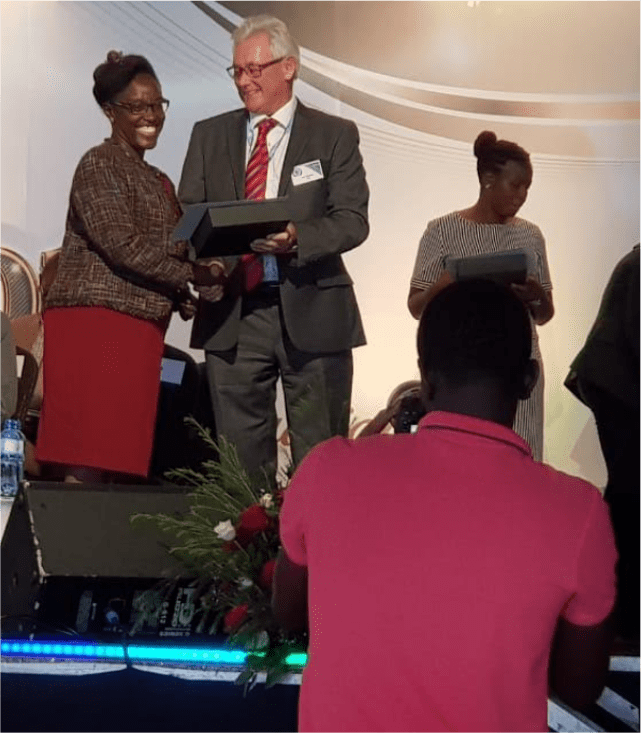 JB: Thank you so much for sharing your insights on that. You’re clearly a person who’s looking outside, at what is happening around the world and bringing this intelligence home and seeing how you can use it within your own your network. So it’s very inspiring to hear that to people who are inspired to join the telecoms industry. What should they do? What can people do to improve themselves to get to the next level to become leaders or people who maybe they’re sat at a desk somewhere in the world, and they have a lot of ambition, and they just want to, they just want to get into telecoms more and to make a mark on it.
JB: Thank you so much for sharing your insights on that. You’re clearly a person who’s looking outside, at what is happening around the world and bringing this intelligence home and seeing how you can use it within your own your network. So it’s very inspiring to hear that to people who are inspired to join the telecoms industry. What should they do? What can people do to improve themselves to get to the next level to become leaders or people who maybe they’re sat at a desk somewhere in the world, and they have a lot of ambition, and they just want to, they just want to get into telecoms more and to make a mark on it.
WK: So I’ve reflected in the last one to two years, I looked at my journey when I entered the telco space, and I looked at the skill sets that were required, they were very diverse, over the journey in the telecom industry, a lot of digital transformation has taken place. So if I was entering the telco space today, the telco industry is facing a new type of challenge. And those challenges or opportunities, because they are complements of each other, it requires new skill sets. So one of the things that has become very critical and very apparent, in every area of the telco space, digital skill set will be power bound. So when you look at the amount of data that the telco companies now have, and generally we are in the information revolution, where there’s just so much information, one of the things that becoming extremely critical is your ability to be very effective at managing data, and using data information much, much more effectively. And I know it may sound simple to some people, it may sound obvious, but there’ll be a lot of innovation going forward around just data. Information will give people insights into how to serve their customers better. So when I had been in wholesale, I travelled on lot and one of the places I ended up was at a data Academy. And in that data Academy, a lot of people were re-skilling. And data scientists were coming out because people were saying in the future, this whole space of data is going to be so material, you have the regulatory side, which is looking at how you manage data privacy, how you use data, for example, to make authentication of customers, something easier, because fraud is a very, very big issue. So there is a lot of innovation coming through around authentic fine, you know, is this the customer, and a lot of companies that are able to handle that whole space of KYC, and are finding that they can give their customers a very pleasant experience. So I see the future as one where the skills will require you to really at least pick a digital skill that is of relevance.
So, we’ve talked about machine learning, we’ve talked about AI, we’ve talked about just your ability to even understand the customer experience, one of the things that’s becoming very interesting, I read about it the other day, and I was quite surprised, is the science around the customer experience. And just being able to really understand the needs of your customer in such a way that you really take the customer experience to the next level. So people who are able to help their companies really enhance and manage that customer experience will be valuable, the whole element around messaging and creativity, positioning. So I think the skills will require two compliments, one, that you’re very open to your creative side, because there will be a need to differentiate yourself, a lot of companies will probably say, I have this information, Company A has this information, and so does Company B, but how do they use that information to differentiate themselves and give the customer a very good customer experience. So I definitely see cyber also as being a very critical element. Even in East Africa, one of the things that has become very apparent in the telco space, the whole issue of cybersecurity, the issue of fraud is very, very key in the space of data. One thing that is very clear, and even when I was in wholesale is the whole data offering in itself will take on different elements.
So, as we talked to customers who had very sophisticated needs, who had multiple locations, you began to find that the solutions were not as simple that they needed to work extremely well. And they needed to not need too much hand holding the one of the things that became apparent to us, it’s your selling solutions, not necessarily of voice, but you’ll be selling solutions. The other thing is that customer interactions will be happening a lot around us. So app will begin to really become the customer interface that you use and that you engage. So it’s a very exciting future. It’s an increasingly digital future. It’s a future in which a complement of disciplines will help. So I’m finding you have marketing, but you also understand some elements of technology, it will just help you become a better marketer. You’re working in finance. But you also understand how you leverage technology in your space to take their financial insights into the next level. You’re working in roaming. I know many people are saying what’s the future? But we began to see this whole IoT space and just telling us what could this look like? Many people say there was roaming, but now what could it look like in the future. So there’ll be a lot more interruptions of different technologies to provide solution.
So, I still think the future is very bright. But the skill sets required are, in my view, technical and therefore to enter into that space to thrive into in that space. I think a good technical understanding of the industry because it will constantly be disrupted by technology will be key.
Nominations for ROCCO IOO 2022 open on October 1st 2021. See this page for more information on October 1st.




